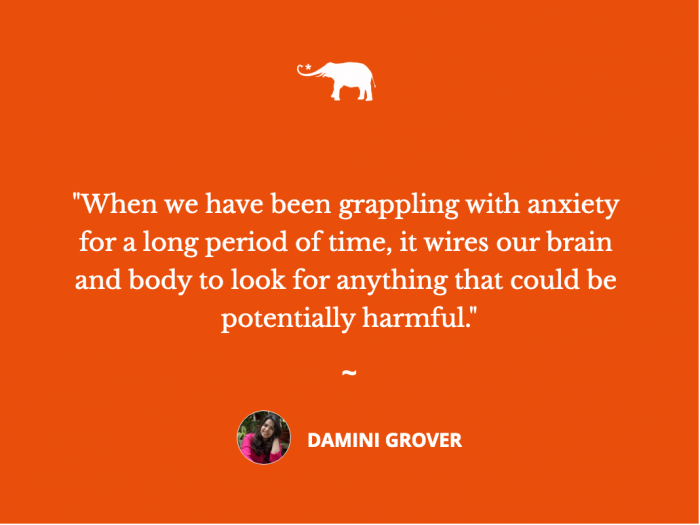“I lay on my bed
Resting after a hard day’s work;
Just when I’m about to close my eyes,
It sneaks up on me
Slowly, quietly.
And I begin to wonder
About the things I’ve never wondered before.
My mind begins to wander
To places it’s never wandered to before.
This anxiety and insecurity
Slowly crawls into my space,
Digging its claws and nails
Into every movement, every action.
It makes me afraid that everything will fall apart,
and I
Simply wait…for all of it to start…”
~
Anxiety has many faces and can show up in any area of our lives, at any time, unannounced.
“Living with anxiety is like being followed by a voice. It knows all your insecurities and uses them against you. It gets to the point when it’s the loudest voice in the room. The only one you can hear.” ~ Anonymous
Whether or not our relationship gives us a reason to be anxious, worried, and insecure, our ever-so-present anxiety can engulf us, wrapping us up in worrisome thoughts and scenarios without taking into account the evidence present in the real world.
Anxiety is a difficult experience to come to terms with. In a matter of seconds, the whole world can begin to seem upside down, and it makes us feel as if we’re hanging by a thread.
No, it doesn’t care whether it’s true or not. It simply begins to change the wiring of our brains, makes us hyper-vigilant, and turns us into a threat-scanning machine.
It’s as if we’re sitting on a roller coaster that keeps going up more than down and doesn’t seem to have a lever to stop it.
When we have been grappling with anxiety for a long period of time, it wires our brain and body to look for anything that could be potentially harmful. It doesn’t even give us enough time to ascertain whether that threat is a valid one or not.
Prolonged and unresolved anxiety eventually finds its way to all areas of our lives and can significantly impact our relationships, and in case the relationship is already on shaky grounds, then it becomes a double whammy for our mind.
Over time, it becomes a difficult experience for the people involved in the relationship.
Anxiety in a relationship can stem from many factors such as:
>> Unresolved childhood trauma
>> Attachment trauma
>> Failure of past relationships
>> Experience of anxiety and stress in other areas such as health, career, family
>> Problems in the current relationship
>> Unhealthy and unworkable beliefs about self and relationships
Often, anxiety in relationships tends to show up as:
1. Constantly worrying about whether your partner loves you or not. You begin to doubt almost everything in the relationship and find it hard to let go of minor events as well. Unchecked and unresolved anxiety can be triggered by anything, and once it comes up to the surface, it anchors itself on anything it finds. A trustworthy, otherwise caring, and loving partner can begin to seem like the quintessential villain.
2. Seeking reassurance all the time. We all seek validation and reassurance from our loved ones every now and then. However, when anxiety begins to dominate our thought process, it makes us seek approval, reassurance, and validation far more than what is required. Our loved ones also begin to feel burnt out and exhausted from all the reassurance they have to give us.
3. Focusing on the negatives of the relationship. When anxiety takes over, it’s as if we’re surrounded by nothing but the dark, black clouds that pour down on us incessantly. It makes us more vigilant, and we begin to look for the negatives of our relationship and partner, and finding the positives becomes nearly impossible. If the relationship is already in troubled waters, fraught with communication and trust issues, then it’s like being sucked into a whirlpool.
4. Over-accommodating our partner’s needs. Anxiety creates a disconnection within us, and in a bid to keep things together, it makes us want to accommodate the other person more. That’s only because our desire to accommodate the other’s needs are backed by our fear of being rejected, left alone, or abandoned. So we tend to let go of our needs to make the other person happy. We tell ourselves “I won’t call now,” “I won’t message,” “I won’t say anything,” without really processing the situation in totality—thus, adding to our already existing anxiety and insecurity.
5. Self-silencing. We end up thinking that if we keep quiet, don’t express ourselves, or accommodate more than what’s needed, things might improve. What we fail to take into account is that it only turns us into a volcano, which will eventually erupt.
6. Maladaptive beliefs about self. A constant state of overthinking, focusing on the negative, being afraid of the “what-if” scenarios eventually highlight or end up creating maladaptive and dysfunctional beliefs about ourselves. It makes us wonder if: “Am I good enough?” “Am I worthy of being loved?” “Will I be accepted?”
7. Feeling attacked. This state of worry and insecurity just changes the way we view people and events. Constant overthinking and overanalyzing keeps our guards up all the time, and even a harmless joke or remark can make us feel like we’re being attacked.
Anxiety is a difficult, painful, and often isolating experience. While some amount of anxiety is normal, rational, and even needed to ensure we stay safe and protected, when it starts to interfere in our daily life and relationships, it needs to be attended to.
Unresolved anxiety can often behave as a rowdy child throwing tantrums wherever and whenever!
Whenever this anxiety shows up, it’s important to then:
>> Name it, acknowledge it, allow yourself to see that it’s come to meet you.
>> Understand that it is difficult, but that’s also your mind’s way of drawing attention to a problem that it wants you to solve.
>> Engage in self-soothing behaviors to allow the feeling to settle down.
>> Journal your thoughts so that you can develop awareness of their triggers.
>> If you can resolve it, great! If not, then it’s important to seek help.
And don’t forget to remind yourself that:
“I have anxiety. That doesn’t mean I can’t conquer what’s making me anxious.” ~ Anonymous
~


 Share on bsky
Share on bsky






Read 25 comments and reply